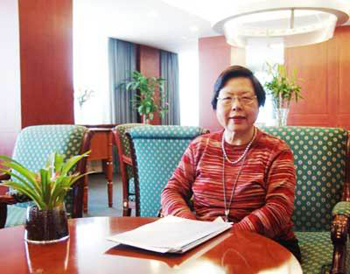| Home / 2007 NPC & CPPCC Sessions / Latest Updates | Tools: Save | Print | E-mail | Most Read |
| HK Deputy: Corporate Tax Increases Welcomed |
| Adjust font size: |
The draft Corporate Income Tax Law is now under discussion at the ongoing NPC session, and will be presented for voting on March 16, 2007. A provision of particular interest stipulates the unification or standardization of the rate of taxation at 25 percent, applicable to both domestic and foreign companies. In our special series on the Corporate Income Tax Law, we’ll be interviewing NPC deputies, entrepreneurs, industry leaders, and scholars for their take on the proposed unified tax rate, its significance, and potential impact on China’s industry and economy. The following is our third interview with a Hong Kong deputy Lau Pui-king. The fourth interview with a Jiangsu Province deputy, Jiang Deming, comes tomorrow. – Editor. To unify or standardize the corporate income tax rate applicable to both domestic and foreign companies is a positive move, according to Hong Kong deputy Lau Pui-king in an interview with china.org.cn, adding that enterprises prefer a fairer and more open market.
"China implemented its opening-up policy almost 29 years ago and is now a member of the World Trade Organization (WTO). A more mature economic market is being developed and therefore a fairer tax policy is needed," she said. China's stable political situation, sound economic development model, huge market, labor sources, and business infrastructure and government service that are being continuously upgraded are the major factors attracting foreign investment. As such, tax breaks are considered less important than transparent taxation and impartial government policies. Lau highlighted that the different tax rates for domestic and foreign companies in different regions are an issue. "It is a kind of distortion of investment. The domestic companies contribute about 80 percent of all corporate tax revenues. "The proposed unified tax rate will help foster a fairer, more regulated and transparent taxation system for all businesses, and help improve the quality and standard of foreign investment utilization." However, critics argue that an across-the-board 25 percent rate of taxation -- a significant change from the current 15 to 33 percent range -- would jack up the combined tax bill of all foreign-funded enterprises by US$5 billion a year. Lau's response is that companies should view the whole of China as a market, and not merely focus on certain regions. "For example, if a company pays 15 percent in one city but has to pay up to 33 percent in 50 other cities, wouldn't a standardized 25 percent mean less tax?" Moreover, the 25 percent rate is comparable to the global average of 26 percent. "(The new tax rate) will spell more opportunities both for domestic enterprises and foreign ones. In fact, the move will encourage companies to spread out more across the country, which will give small to medium-sized companies more room to develop." She added that she did not expect any reduction in foreign investment as a result of the change. Last year, China reported record tax revenues of 3.76 trillion yuan (US$485.6 billion), excluding tariffs, tax on farmland acquisition and tax on real estate contracts. Foreign-funded companies contributed 153.4 billion yuan (US$19.8 billion), or 4 percent of the total. The figures show that domestic companies contribute the bulk of tax revenues. By official calculations, the new rate will reduce tax payable by domestic companies by 134 billion yuan (US$17.3 billion). Foreign companies will correspondingly pay about 41 billion yuan (US$5.3 billion) more in taxes. Despite this, however, the state coffers will see a reduction of 93 billion yuan (US$12 billion) overall. Nonetheless, China's fast growing economy, improved competitiveness of businesses and growth momentum of fiscal revenue have convinced tax and financial officials that the country can manage the loss. Transitional preferential measures will be given to allow the old enterprises, which had an income tax rate of 15 percent or 24 percent under the current tax laws, to enjoy a gradually increasing income tax rate within five years after the new tax law takes effect, according to the draft law. At the same time, preferential tax policies will be shifted to investment in projects concerning environmental protection, water conservation, production safety and high-tech development.
Our previous two interviews: Sichuan Deputy: Tax Cut Good News for Chinese Companies Standardized Corporate Tax Rates for Level Playing Field (China.org.cn by staff reporter Wang Ke, March 10, 2007) |
| Tools: Save | Print | E-mail | Most Read |
 |
| Related Stories |
